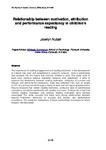Relationship between motivation, attribution and performance expectancy in children's reading
| dc.contributor.author | Nuttall, J. | |
| dc.date.accessioned | 2019-05-20T09:36:55Z | |
| dc.date.available | 2019-05-20T09:36:55Z | |
| dc.date.issued | 2016 | |
| dc.identifier.citation |
Nuttall, J. (2016) 'Relationship between motivation, attribution and performance expectancy in children's reading', The Plymouth Student Scientist, 9(1), p. 214-228. | en_US |
| dc.identifier.issn | 1754-2383 | |
| dc.identifier.uri | http://hdl.handle.net/10026.1/14122 | |
| dc.description.abstract |
The importance of reading engagement and reading attainment in the development of children has been well established in research; however, there is significantly less research into the factors that motivate children to read. This study looks to build upon previous reading motivation literature and, specifically, it aims to examine the relationship between reading motivation, attribution of success and failures, and performance expectancy. Data was collected from year six pupils (n=27) at a primary school through a series of tests and self-report questionnaires. Results indicated that neither reading motivation, attribution style or performance expectancy correlated significantly with reading test score. Analysis did reveal that intrinsic reading motivation and extrinsic reading motivation were strongly associated. The study revealed that there were strong relationships between reading motivation, attribution of success and failures, and performance expectancy. The academic implications of these relationships and scope for future research are discussed. | en_US |
| dc.language.iso | en | en_US |
| dc.publisher | University of Plymouth | |
| dc.rights | Attribution 3.0 United States | * |
| dc.rights.uri | http://creativecommons.org/licenses/by/3.0/us/ | * |
| dc.subject | children's reading | en_US |
| dc.subject | reading | en_US |
| dc.subject | children | en_US |
| dc.subject | motivation | en_US |
| dc.subject | attribution | en_US |
| dc.subject | performance | en_US |
| dc.subject | motivation literature | en_US |
| dc.subject | attribution of success and failures | en_US |
| dc.subject | performance expectancy | en_US |
| dc.subject | primary school | en_US |
| dc.title | Relationship between motivation, attribution and performance expectancy in children's reading | en_US |
| dc.type | Article | |
| plymouth.issue | 1 | |
| plymouth.volume | 9 | |
| plymouth.journal | The Plymouth Student Scientist |



